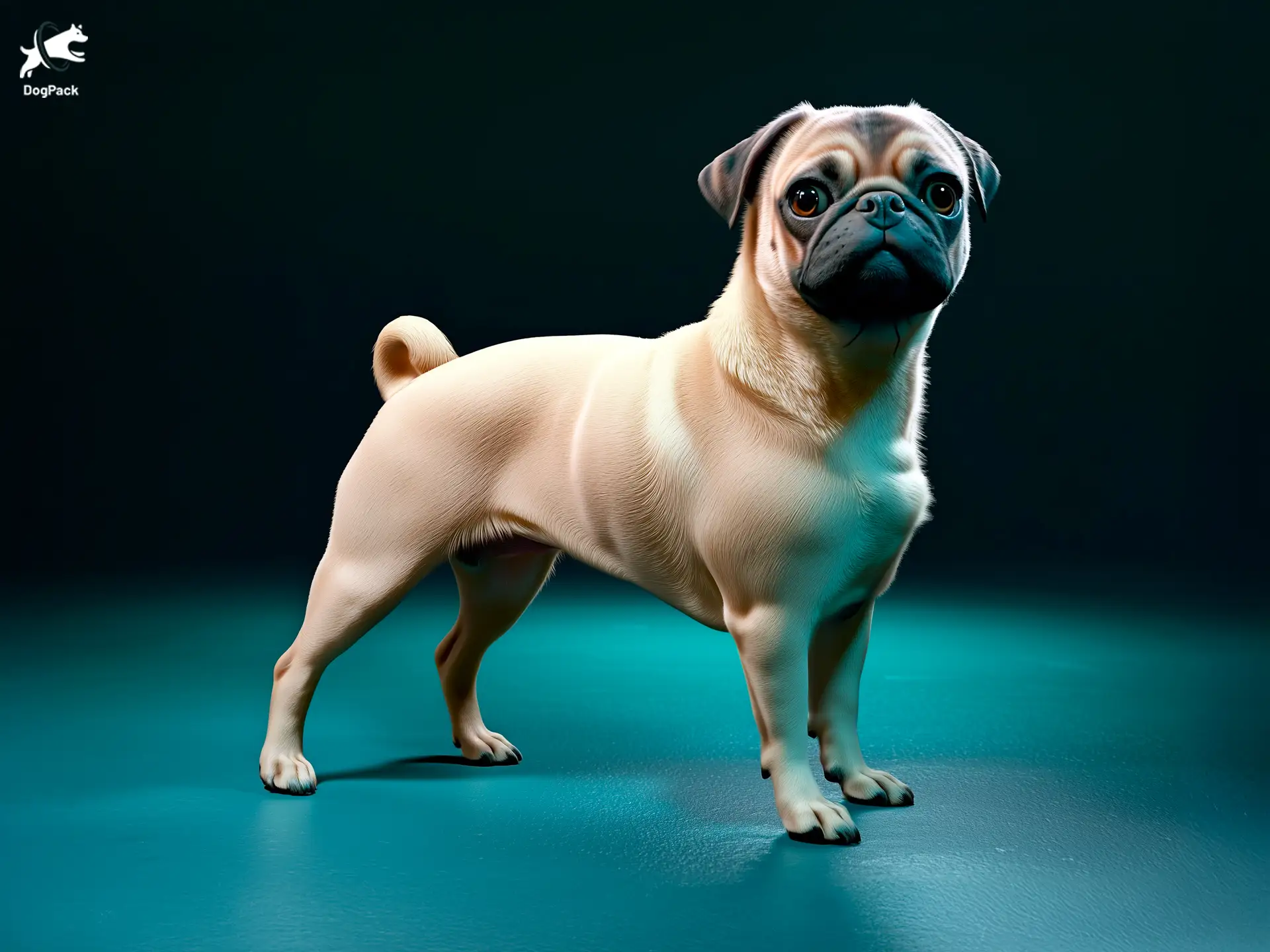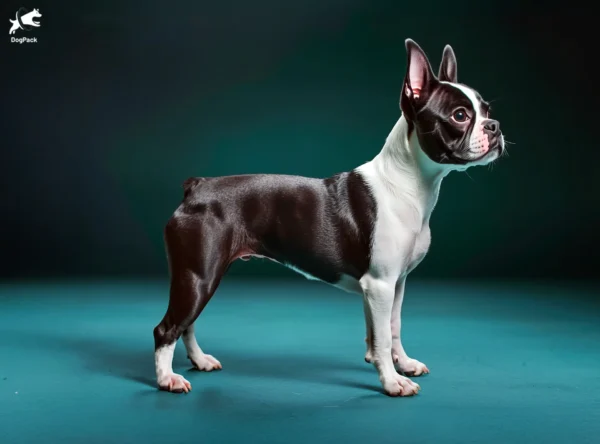Bugg Dog Breed Info & Overview
The Bugg, a delightful mix of Pug and Boston Terrier, combines affectionate charm with playful energy. Known for their loveable nature and entertaining antics, Buggs are well-suited for both families and singles. With a compact size and adaptable personality, they thrive in apartment settings, making them an ideal companion for those seeking a small, spirited friend.
Characteristics
Pictures
Breed History
The Bugg is a relatively new hybrid, emerging in the United States within the last few decades. This breed was developed to blend the Pug’s loving nature with the Boston Terrier’s lively spirit. While not as storied as purebreds, the Bugg’s lineage brings together rich histories from both parent breeds.
Early breeders aimed to create a companion dog that embodied the best of both worlds. The Pug’s origins trace back to ancient China, where they were cherished by royalty. The Boston Terrier, on the other hand, was developed in the United States as a friendly and intelligent breed.
Today, the Bugg is gaining popularity for its endearing looks and delightful personality. Though not recognized by major kennel clubs, they have a growing fan base among dog enthusiasts.
Temperament, Personality
Buggs are known for their affectionate and sociable nature. They thrive on human interaction and are happiest when they’re part of family activities. These dogs are great with children and can get along well with other pets, especially if socialized early.
Their playful demeanor makes them entertaining companions. Buggs are intelligent and curious, often showing off their antics to get a laugh. They can be a bit stubborn at times, a trait inherited from their Pug parent, but their eagerness to please usually wins out.
While they are friendly with strangers, Buggs also make good watchdogs, alerting their owners to any unusual activity. Their balanced temperament makes them suitable for first-time dog owners.
Physical Characteristics
The Bugg is a small dog with a compact, muscular build. They often have the expressive eyes and wrinkled forehead of a Pug combined with the erect ears and sleek coat of a Boston Terrier. Their coat colors can vary, including black, fawn, brindle, or a mix of these.
Their tails can be curly like a Pug’s or straight like a Boston Terrier’s. Buggs typically have a short muzzle, but it’s usually slightly longer than a purebred Pug’s, which can help with breathing issues common in brachycephalic breeds.
Overall, the Bugg’s appearance is a delightful blend of its parent breeds, resulting in a uniquely adorable dog that’s sure to turn heads.
Health Issues
Buggs are generally healthy but can inherit health issues from their parent breeds. Common concerns include brachycephalic syndrome due to their short muzzles, which can lead to breathing difficulties. Eye problems like cataracts or corneal ulcers may also occur.
It’s important to monitor their weight, as obesity can exacerbate breathing and joint issues. Regular veterinary check-ups are essential to catch any health problems early. Ensuring that the Bugg comes from a reputable breeder who tests for genetic conditions can minimize health risks.
Preventive care, including vaccinations and parasite control, will help keep your Bugg in optimal health. Always provide fresh water and avoid overexertion, especially in hot weather.
Grooming Needs
The Bugg’s short coat is relatively low-maintenance. Weekly brushing will help remove loose hair and keep their coat shiny. During shedding seasons, more frequent brushing may be necessary to manage moderate shedding.
Facial wrinkles should be cleaned regularly to prevent skin infections. Dental hygiene is also important; brush their teeth several times a week to reduce the risk of dental disease. Nail trimming and ear cleaning should be part of their routine grooming.
Bathing can be done as needed, usually once a month or when they get particularly dirty. Using a gentle dog shampoo will help maintain their skin’s natural oils.
Exercise Requirements
Buggs have moderate energy levels and require daily exercise to stay healthy and happy. A 30-minute walk combined with some playtime should suffice. They enjoy games like fetch and can be quite playful indoors, making them suitable for apartment living.
Be cautious not to overexert them, especially in hot or humid weather due to their potential breathing issues. Interactive toys and puzzle feeders can also help keep their minds stimulated.
Regular exercise not only keeps them fit but also helps prevent behavioral issues that can arise from boredom or pent-up energy.
Training Tips
Training a Bugg can be a rewarding experience thanks to their intelligence and eagerness to please. Positive reinforcement methods work best—use treats, praise, and affection to encourage good behavior. Consistency is key to overcoming any stubborn streaks.
Early socialization is important to ensure they grow up to be well-rounded dogs. Expose them to different people, places, and other animals to build confidence. Enrolling in a puppy training class can provide structured learning and social opportunities.
Avoid harsh corrections, as Buggs are sensitive and may become fearful. Patience and a gentle approach will yield the best results.
Nutrition, Diet
Feeding your Bugg a balanced diet is crucial for their health. High-quality commercial dog food formulated for small breeds with moderate energy levels is recommended. Portion sizes typically range from 1 to 1.5 cups of kibble per day, divided into two meals.
Monitor their weight to prevent obesity, which can lead to health complications. Treats should be given sparingly and factored into their daily calorie intake. Foods rich in omega fatty acids can help maintain a healthy coat.
Always provide access to fresh water, and consult your veterinarian for personalized dietary advice based on your Bugg’s age, activity level, and health status.
Adoption, Breeders
If you’re interested in adding a Bugg to your family, consider adopting from a rescue organization that specializes in small or mixed breeds. Websites like Petfinder can help you locate Buggs in need of a home.
If you choose to go through a breeder, ensure they are reputable and prioritize the health of their dogs. Ask for health clearances for both parent breeds to minimize the risk of genetic health issues. The Bugg Lovers Group may provide resources for finding responsible breeders.
Avoid purchasing from puppy mills or pet stores that do not provide transparent breeding practices.
Family Pet?
Buggs make excellent family pets due to their affectionate and playful nature. They are generally good with children and enjoy being part of family activities. Their small size makes them suitable for households with limited space.
Supervision is recommended around very young children to ensure gentle interactions. Buggs can also get along well with other pets if introduced properly. Their friendly disposition means they quickly become cherished members of the family.
Their adaptability and love for companionship make them a delightful addition to many different types of households.
Right For You?
If you’re looking for a small, loving, and entertaining companion, the Bugg might be the perfect match. They are well-suited for apartment living and adapt easily to various lifestyles. First-time dog owners will appreciate their manageable grooming and exercise needs.
However, potential owners should be prepared to provide the attention and affection Buggs crave. They may not do well if left alone for extended periods. Being mindful of their potential health issues and committing to regular veterinary care is also important.
Ultimately, the Bugg offers a lot of love and joy to the right home.
Conclusion
The Bugg is a delightful blend of charm and playfulness, making it a wonderful companion for a variety of households. With their affectionate nature and manageable care requirements, they are an excellent choice for families, singles, and seniors alike. If you’re ready to welcome a loving and entertaining friend into your life, the Bugg might just be the perfect fit.
FAQs
-
Why are Buggs known for their playful personalities?
Buggs, a mix of Boston Terrier and Pug, inherit playful traits from both parent breeds. This blend creates a fun-loving, spirited dog that thrives on interaction and enjoys engaging in games and family activities.
-
Do Buggs require a lot of mental stimulation?
Yes, Buggs benefit from mental stimulation to keep them entertained. Puzzle toys, short training sessions, and interactive play help prevent boredom, which can sometimes lead to mischievous behaviors.
-
How do Buggs handle being left alone?
Buggs may struggle with extended periods alone, as they are social and bond closely with their families. Gradually acclimating them to alone time and providing engaging toys can help manage potential separation anxiety.
-
Are Buggs prone to any specific health issues?
Buggs may inherit breathing issues from their Pug lineage, especially due to their short noses. Regular vet visits and monitoring for respiratory signs are essential, particularly during hot weather.
-
How much exercise does a Bugg need?
Buggs require moderate exercise, typically about 30–45 minutes daily. Short walks and playtime keep them physically fit, as they are active but not overly energetic.
Breed Ratings
Buggs are smart and quick learners, making training a rewarding experience.
They have a joyful spirit and love engaging in play with their families.
With moderate energy, Buggs enjoy daily walks and playtime but also appreciate relaxation.
Shedding is low to moderate, making grooming manageable.
Buggs have a low prey drive but may chase small animals occasionally.
Their short coat requires minimal grooming effort.
Responsive to positive reinforcement, they are generally easy to train.
Buggs prefer company and may experience separation anxiety if left alone too long.
They bark to alert but are not overly noisy.
Drooling is minimal, making them fairly tidy companions.
Generally sociable with other dogs when properly socialized.
Healthy overall but may be prone to certain genetic health issues.













